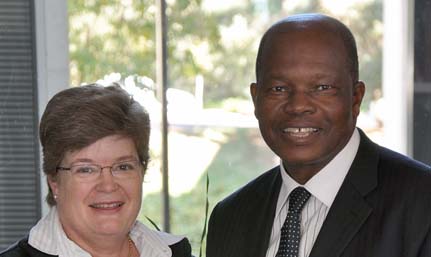Latest News Archive
Please select Category, Year, and then Month to display items
27 December 2019
|
Story Dr Cindé Greyling
|
Photo Supplied

KovsieInnovation at the UFS is bridging the gap between industry and academics with a powerful force. For too long, research remained an academic pursuit, with many innovative ideas stuck between the pages of a thesis – only to come alive during exclusive, short-lived conference proceeds.
KovsieInnovation
Recently, Gerard Verhoef, Director in the Directorate: Research Development (DRD), and his team from KovsieInnovation finalised their Innovation and Commercialisation Strategy in order to create a structured pathway for good ideas. The primary objective of KovsieInnovation – the UFS Innovation and Entrepreneurship Office – is to achieve sustainable growth in third-stream income from innovative research activities stemming from the UFS. “Potential successful ideas must be feasible, viable, and sustainable, and we formulated an eight-step plan to facilitate this,” Verhoef explains. Ultimately, the DRD wants to attract new and continuous research as a renowned academic knowledge partner that can foster, drive, and successfully commercialise innovative research activities; and in doing so, foster an entrepreneurial culture at the UFS.
Liquid Culture
One such success story is the development of Liquid Culture into a business of choice, supplying liquid yeast to breweries and bakeries. Christopher Rothmann and Dr Errol Cason are the driving forces behind this company that produces their sought-after and stable yeast product in the Department of Microbiology, Biochemistry and Food Biotechnology at the UFS. With world-class equipment and laboratories, they house one of the largest yeast-culture collections in the world.
Both Rothman and Dr Cason were home brewers for many years before starting to produce commercial batches. They believe it would not have been possible without the help of KovsieInnovation. This project was also one of the finalists in the National Entrepreneurship Intervarsity.
Christo Strydom Nutrition (CSN)
Another innovative way in which the UFS generates third-stream income via the DRD, is by partnering with already successful commercial products. One such example is the recent successful royalty agreement with CSN. With this transaction, the university unlocked its brand potential to the benefit of both the industry partner and the UFS. Quality assurance remains the key success factor for deals like this.
Valuable advice for businesses in difficult times
2013-04-15
|
 |
|
Prof Helena van Zyl, Director of the Business School, and Dr Reuel Khoza.
Photo: Stephen Collett
15 April 2013 |
Dr Reuel Khoza, Chairman of the Nedbank Group, shared the group’s valuable rules for managing a bank in difficult times in an MBA lecture on the Bloemfontein Campus. Dr Khoza is a visiting professor at the UFS Business School.
He focused in the lecture on the group’s business and leadership model and highlighted some do’s and don’ts:
- Do not surprise your stakeholders on the downside – communicate transparently, particularly when there is bad news.
- Retrenching staff to contain costs should be a last resort – the damage to corporate culture from retrenchments is immense. Follow and support your customers – get as close to them as possible because business changes slowly, but customer behaviour can change in an instant.
- Integrated central capital and funding management.
- Entrench well-established reporting, KPIs and measurement systems.
- Ensure strong independent risk management.
- Manage your cost base – anticipate downturns and re-base your costs to avoid crisis-cost management.
- Take advantage of opportunities – an economic downturn creates a situation where valuations fall and assets are sold off, which can be a great opportunity for acquisitions.
- Keep innovating – innovation does not have to be a costly exercise, as the right culture can promote and encourage experimentation and collaboration.
- Whatever you do – avoid a price war, as expedient pricing decisions may hurt the business in the longer term.